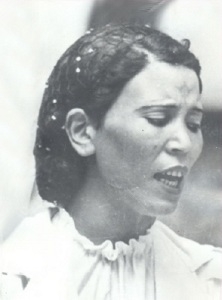What about art, the great art of Saliha, on the occasion of the centenary of his birth, when everything was said, or almost, since she left us a certain November 26, 1958? Then remains the hidden side of the great diva, that is to say her intimate life, her joys and her sufferings, her “storms and her calm seas” (see Gilbert Bécaud), and all these happy and unhappy events, which shape you the life of a human being.
With Saliha’s life and although we only know two or three things about her, as Jean-Luc Godard would say, there is something to make a successful soap opera, with four major episodes that would retrace the hectic journey of a woman who suffered, of course, but who also had her hours of glory.
A difficult childhood
First episode: Sallouha’s difficult childhood (Saliha’s real first name). Born in 1914 in Nebeur, in the current KEF governorate, she is forced, from a young age to leave the native village with her mother M’Barka, her sister Eljia and her father Brahim, from an Algerian village near Souk Ahras. It was then the start of crossing the desert. First step: Mateur. Then the family moved to Tunis. There, Sallouha and Eljia are placed in the family of M’hamed Bey, brother of the famous Moncef Bey, the “King-Martyr”.
But something bad is good: Sallouha is, suddenly, in contact with the world of music and song. Indeed, in the home of M’hamed Bey, we often receive the great singers of the time, and the princesses learn to play musical instruments, as in several families of the Tunisian bourgeoisie. Sallouha, hiding in secret the mistresses of the house, then discovers her singer gifts.
As in a novel by Hugo, our national cosette passed, in 1927, in the service of a singer named Badria. There too, and as if Sallouha’s fate was sealed in advance, it is again in an atmosphere conducive to the emergence of its talent.
An eventful youth
Second episode: some time later, fate (with a capital “d”) will be Hassouna Ben Ammar, a lawyer from Tunis who, one day passing in front of Badria’s house, at rue du Pacha, hears Sallouha sing. Thanks to him, Sallouha took his first steps in the world of song. A real fairy tale!
But in the meantime, the misfortunes fell on Sallouha: her young brothers suddenly die, her parents divorce, we marry her very young, but her marriage will not be a success. The only light in this blackboard: the birth of her daughter, the future singer Choubeila Rached.
It is in music that Sallouha will find comfort. Béchir Fahmi, a tripolitan artist residing in Tunisia, is the first to take it in hand, according to some sources. Others indicate that this merit goes to Béji Sardahi who integrates him into his musical troupe and gives him the pseudonym of Soukeina Hanem.
The fact remains that the real first meeting of Saliha (under this name perhaps) with the general public dates back to a certain October 15, 1938, at the municipal theater of Tunis, on the occasion of the inauguration of Radio Tunis. But the consecration, the real one, will take place when it will enter the Rachidia, after it was presented to Mustapha Sfar, mayor of Tunis and founder of the Rachidia in 1934.
At the top of glory
Third episode: it is then the start, for Saliha, of a splendid period which will last until his death. With Rachidia, she will have her greatest successes. The greatest poets of the time (El Arbi El Kabadi, Mohamed Marzouki, Ahmed Kheireddine, Mustapha Agha …) and the most famous composers (Khémaïs Ternane in particular but also Salah El Mehdi, Kaddour Srarfi, Mohamed Triki …) will be at the service of his voice, an immense and inequal voice to the present day. “Rachidia is me,” could have said Saliha, as Louis XIV said. The beginning of this merger was marked, it is said, by “Men Freg Ghzali”, then the successes did not have an end.
With success and glory, the ex-Sallouha finally benefits from a certain material comfort: a monthly renown and a accommodation supported by the Rachidia. Saliha is far from the miserable days of her childhood, but the failures which, it seems, mark out her effective life, tarnish her found happiness.
A star turns off
Fourth episode: the disease comes to spoil Saliha’s success, but it overlooks the advice of her doctors prescribing her rest. Result; She had to have an operation, at the end of 1957, following a crisis of which she was the victim when she sang at Kef with the El Manar troop of Ridha Kalai. Shorting her convalescence, against the advice of her doctors, she returns to the stage.
She will make her last appearance in public on November 10, 1958 at the Tunis municipal theater during a Tunisian-Moroccan gala, where, as if by chance, she sings “Mridh Féni”. Fifteen days later, on November 25, 1958, she left life following a second operation which will be fatal to her.
The suffering of the last days must have been terrible for our big diva, but death will appease everything, and our soap opera will end with images of Saliha’s burial in El Omrane and the farewell that is made to him by a large crowd of admirers.
Adel Lahmar








